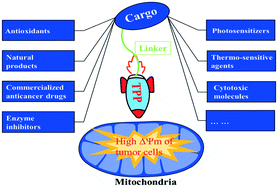TPP-based mitocans: a potent strategy for anticancer drug design
Abstract
Cancer is one of the most important problems that endanger human health. The number of cancer patients is increasing rapidly worldwide. Compared with normal cells, cancer cells exhibit abnormal metabolism (abnormal glycolysis and oxidative phosphorylation, high levels of reactive oxygen species, anti-apoptosis, high mitochondrial membrane potential, and so on), and specific targeting of these metabolic abnormalities would be a promising drug design direction. These physiological characteristics are closely related to tumorigenesis and development, which are mainly regulated by mitochondria. Therefore, mitochondria have become important anticancer drug targets, attracting much attention in recent years. In this review, we systematically summarize various mitochondrial anticancer drugs developed, especially mitocans based on triphenylphosphonium (TPP), and discuss the advantages of TPP in endowing mitochondrial targeting function.



 Please wait while we load your content...
Please wait while we load your content...